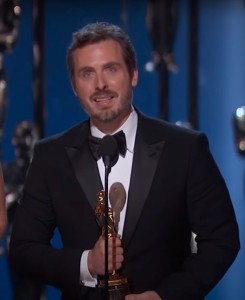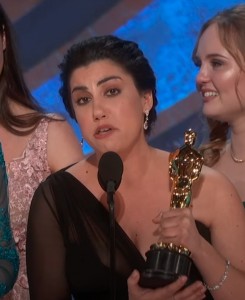Regarded as cinema’s ultimate prize, the Oscars are often viewed as the pinnacle of a filmmaker’s career, confirmation that you’ve “made it”. A lot has already been written about the shortlist process, the tireless campaigns and the star-studded ceremony, but what happens once you’ve gotten your hands on one of those infamous statuettes? For actors there is talk of a career curse after winning an Academy Award, but what about the emerging filmmakers who win the one of the three short film categories?
Here at Short of the Week, we’re already eagerly anticipating the announcement of the next winners of the Best Animated Short Film, Best Documentary Short Film and Best Live-Action Short Film categories at the 95th Academy Awards. We’ve made our predictions and have our individual favorites, however, to offer further insight into the highlight of awards season, we invited previous Oscar-winners Patrick Osborne and Rayka Zehtabchi to look back on when they won their awards and discuss what it has meant for their careers.
***

Patrick Osborne
Beginning his career as an animation supervisor on the Oscar winning short Paperman and an animator on Disney features including Wreck It Ralph & Tangled, Osborne is an expert in crafting emotionally captivating animated films that have earned him critical acclaim and some of the film industry’s most coveted accolades.
Won a Best Animated Short Film Oscar in 2015 with Feast. Nominated again in 2017 with Pearl.

Rayka Zehtabchi
An Iranian-American director based in Los Angeles, Zehtabchi’s passion lies in telling human stories that bring awareness and action to little-known social causes. In both documentary and narrative, she brings a naturalistic approach to her storytelling, striving for honesty and intimacy on screen.
Won a Best Documentary Short Film Oscar in 2019 with Period. End of Sentence.
***
Take us back to the day of the ceremony, what was it like attending such a high-profile event? Is it all as glamorous as it looks? Did you get to walk the infamous red carpet?
Patrick: Attending the Oscar ceremony completely lives up to the hype. It is a classy and glamorous as it looks on TV. Everyone is thrilled to be there. It’s the one event where even the most jaded and famous are excited to be a part.
Rayka: It’s as glamorous as it gets. I remember we started getting ready first thing in the morning, but the ceremony didn’t even start until early evening. I just wish I had eaten something or had coffee beforehand because once you go in, you’re there the entire day. The experience was like no other.
“Being on the Oscars red carpet all of a sudden was almost dizzying”
Patrick: I’ve been a few times now, both as a spectator, nominee and winner… and though coming out with a win was the best, I very much enjoyed attending the show with no horse in the game. There is something to be said about just wandering around the grounds wide eyed, taking in the glitz. Of course we walked the red carpet, and we walked SLOWLY. No need to rush a once (or twice) in a lifetime moment like that.
Rayka: The red carpet and the walk was a lot more contained than I thought it would be. It felt like such an out-of-body experience for me. A couple of years prior to being at the ceremony, I was a film student at USC film school and after graduating I was just doing whatever I could to make ends meet – whether driving for Uber or being a PA on a reality show. So being on the Oscars red carpet all of a sudden was almost dizzying. I was so grateful for every moment that I was there, but I also felt a little bit like an outsider looking in, even though I was really at the epicenter of it all.
With so many big names from the world of filmmaking in one room does the event lead to some good networking opportunities and did you make any contacts that helped your career?
Rayka: Of course. You meet tons of people throughout the process. It’s networking overload.
Patrick: At the Oscars event itself, Networking was the last thing on my mind. I just wanted to be present, remember to thank the right people in the case that I won. I met so many wonderful people, but only for the sake of saying hi, congratulations, love the dress, etc… The nomination and award did however change my career. It opened up many many doors, and has led to every project and opportunity that has come my way since.
Rayka: There’s a lot of events leading up to the Oscars too. So you find yourself, in the two months leading up to the Oscars, in this incredible position where you’re networking day in and day out. I quickly realized that there’s nothing more important than building honest and authentic relationships with people, as opposed to thinking of it as this is one fleeting moment and I have to go in there with my pitch or have something ready to go.
How were you feeling in the build-up to the announcement? Were you convincing yourself that even just being nominated was an honour or deep inside did you really want to leave with that shiny statuette?
Patrick: The idea of being nominated, or winning, an Oscar seemed so surreal and impossible in the first place, I was truly just happy to be there. Of course you know it will be better to win, but I loved the other nominees my year, and could easily see them taking it home too.
“Win or no, the nomination changed my life and career”
Rayka: Part of it was a blur! I feel like I had a guard up all day, otherwise I would have just been too emotional. So when we won, that guard came down all of a sudden and all of the emotions that I’d been feeling from the months leading up to it and from the years of working on the film just kind of all poured out in one moment.
Patrick: Win or no, the nomination changed my life and career. They say no matter what you do from then on, your obituary will start with “Oscar winner” and I have to think it’s true.
The winner’s speech provides you with a platform to thank those who played a vital role in your film/career and also an opportunity to share an important message. How did you approach this moment? Were you prepared or did you just wing it?
Rayka: At that point, we had been campaigning for several months. We had done so many interviews that those talking points just organically rose to the surface.
Patrick: I was terrified of the speech and did not want to wing it. I thanked the people who played the biggest part… my family, colleagues, the academy, gave a shout out to my home town, which as it turns out is a great thing to do as it gets plenty of attention in local news.
Rayka: You only have around 45 seconds, which can be split between whoever is collecting the award, and there’s all these rules around that moment. So we were like, okay, let’s make sure that we plan something so that we don’t forget people. I knew that I wanted to talk about my period in some way. When it happened, I just happened to be on my period, so just blurted it out.
Patrick: The reaction to my speech ranked 11 according to Vanity Fair, and that was a win in my book. “Thanked the right people and got off the stage”, they said.
2022 saw the short film categories axed from the main telecast, from your experience, does short film feel like it’s somewhat sidelined at the awards?
Rayka: The year we won, there was also discussion around taking just the short films off the telecast. They didn’t end up going through with it, but when your category’s the only one that’s in discussion for removal, you do definitely feel sidelined a little bit. I think there’s this overwhelming sense that short films are sort of the junior varsity team and I’ve always hated that. I’ve spent my career to date making short films and it’s by choice as the short form is a fantastic medium for storytelling, an opportunity to discover your voice as a filmmaker and it has a very low barrier of entry.
“Shorts have such a tough time finding an audience. Give them the air time.”
Patrick: It’s embarrassing. The Academy shouldn’t sideline the awards for who the award means the most. Shorts have such a tough time finding an audience. Give them the air time.
Rayka: Last year, it wasn’t just the short films, it was several other categories that celebrate the craft of filmmaking, which is devastating. Film is such a collaborative medium and you can’t have a film with any of the parts missing.
How important do you think it is that short film is recognised at such a prestigious event and what influence do you think it has on emerging short filmmakers to see their peers receiving these awards?
Patrick: Every filmmaker starts with a short. I don’t know that it necessarily drives anyone to make a short, but it’s great to know that they are respected on the industry’s biggest stage.
Rayka: People who maybe aren’t even that invested in film are tuning in to watch the Oscars, so when you bring the short films to the stage, those people are also taking an interest in short films. Personally, I started taking interest in the shorts categories at the Oscars because I was making short films too and wondered if this was a path I could follow. So I think it definitely makes a big difference to be able to see those filmmakers on the stage.
With this year’s nominees for the Best Director award all male, once again, how important do you think it is to see diversity and representation in these short film categories? Especially, as they’re considered by many as a “stepping stone” to feature film?
Rayka: It’s immensely important. I think with that lower barrier of entry, that we discussed earlier, filmmakers who come from underrepresented backgrounds have more of an opportunity to go out and tell the stories that they want to tell. Right. And so you’re getting a much more eclectic mix of voices and stories. If you don’t have the Oscars, if you don’t have distributors, then you’re burying those films and there isn’t the opportunity for the wider public to pay attention to these films.
“It was the first time that I had seen that level of representation in the film industry and it opened so many doors for me”
Patrick: Shorts tend to be more diverse than the rest of the categories. It would be nice if making a short was as much of a stepping stone as people say that it is. If so we’d see more diversity in the feature categories. Some short directors get their features. Some don’t. Diversity in storytelling is what keeps film making fresh. New perspectives are the life blood of the industry.
Rayka: I never thought that I could be on that stage. One of the things that I saw when I was younger that really inspired me was Iranian filmmaker Asghar Farhadi who won the Academy Award for foreign film category for A Separation. For me, it was the first time that I had seen that level of representation in the film industry and it opened so many doors for me.
There seems to be an impression that once you’ve won an Oscar you’ve “made it”, how has that win affected your career?
Rayka: For me, it was difficult. And I always say this cautiously, because I’m approaching it from this immense position of privilege of being someone who won an Academy Award at a very young age. All of a sudden I was getting all these meetings and opportunities and at the same time I was thinking, I literally just started doing this. So I had a really hard time in the years following the Oscars, where I was dealing with imposter syndrome.
Patrick: The idea of “making it” is a funny one. Most Oscar winners, other than maybe the acting and directing categories, lead fairly modest lives as far as Los Angeles living standards are concerned… but it does pretty much guarantee you can keep working as a creative person, continue making stuff for the rest of your life.
Rayka: The thing that really helped me was continuing to make my films, my short films. Not being really beholden to anyone or going for these major budgets or anything, but really just quietly working with my friends and partners and collaborators and just making these short films that I loved and adored and gave me the opportunity to explore different facets of my personality.
Patrick: I’ve been able to make films everyday since winning the Oscar. That in my book is a success.
Finally, the biggest question of all…where do you keep your Oscar statuette?
Patrick: We have an old Saloon style upright grand piano in our living room. The Oscar rests on top of the piano next to a maquette of Winston, the central character in the film that won the award.
Rayka: For the first couple years, I hid it in a cabinet. As I was dealing with all of those weird feelings and emotions, it made me nauseous and fearful if I saw it. I felt like whatever I did next had to make a splash that big. Now it’s on the fireplace mantle, the centerpiece of the living room, which is an indicator of how far I’ve come in getting over my fears!
 Short of the Week
Short of the Week